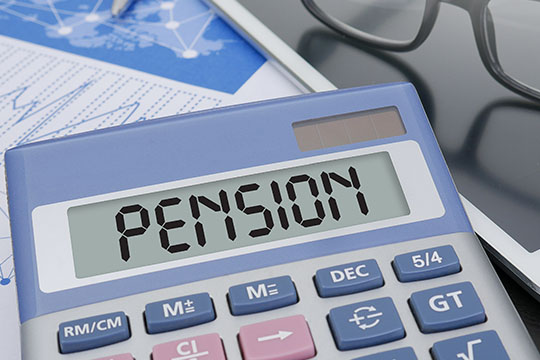
As the COVID-19 pandemic continues around the world, Russia and Saudi Arabia have been in an oil-price war. Both events bring significant economic insecurity. Millions are under stay-at-home orders, and applications for employment insurance are at an all-time high. Stocks have plunged, losing most of the gains that had been made over the last three years. On March 23, 2020, the Dow Jones hit its lowest point since 2016, then jumped back up modestly with news of massive government economic stimulus packages (and then went back down again). The VIX (Cboe Volatility Index – also referred to as the “fear index”) has been at levels not seen since the 2008 global financial crisis. This ambiguity and financial whiplash have left many wondering what will happen to their pensions and savings.
While there is uncertainty, it is possible to make out some light in the darkness. Obviously, the funding status of many pension plans will be affected by drops in equity markets and a decrease in long-term government bond yields. At the time of writing, some estimates have projected that pension plan solvency may drop by between 10 to 25 per cent. This is likely to have several consequences depending on the type of pension plan or savings mechanism in question.
Members of defined contribution plans will likely see declines in the plan’s expected returns. If a member of a defined contribution plan is retiring, his or her pension is likely to be worth less than it was before the crisis started. Target benefit plan members will likely face increased contributions and reduced pension payouts, not to mention the potential for a pause on indexation for the foreseeable future, depending on the plan’s specific rules.
Members of defined benefit plans may be less affected. Statutory or legal obligations require contributions to continue to be made to defined benefit pension funds, usually regardless of economic turmoil, and defined benefit pensions are made to last over the long haul. However, defined benefit plans will also be less solvent over the coming few years. If the employer that sponsors the defined benefit plan has to fold or declare bankruptcy – which is a prospect some employers will face as we recover from the impacts of the COVID-19 pandemic – their pensions will be worth less, especially in areas of the country where solvency requirements are less stringent.
Defined benefit plans may also be under increasing pressure to wind up or terminate, or to convert to defined contribution plans. When pension plans are less solvent, employers’ liabilities may increase on balance sheets. The current economic uncertainty will be a strong motivator to erase these pension liabilities, potentially by moving away from defined benefit plans.
Those with Registered Retirement Savings Plans (RRSPs) may expect to take significant hits to the value of their investments, and this period will be difficult until equity markets recover.
Mark Machin, the CEO of CPP Investments, the organisation that invests the funds we put into the Canada Pension Plan (CPP), recently said that “people shouldn’t think it’s Armageddon forever.” Many pension plans, like the CPP, are built for the long term. Just last year, Canada’s Chief Actuary reported the CPP will be stable for the next 75 years. The CPP has a diversified portfolio that includes real estate and other long-term investing assets. This reduces risk from overexposure to any one market or class, like significant dips in the energy sector. Machin pointed out that during the financial crisis in 2008, the CPP fund lost 18.8 per cent in one year, but six years later, it gained 18.3 per cent in one year. The idea behind pension funds is regular contributions and smart investments to fuel long-term performance, not performance during a single event, like the pandemic in which we find ourselves. For its part, PSP Investments, the investment organization responsible for the federal public sector pension plans, has stated that it is a long-term investor and a financially stable player in the global financial system. It has AAA credit ratings, it is cash flow positive and its leverage is low (meaning PSP Investments has not borrowed money to invest). It is also worth noting that a portion of our members’ pensions is tied to pre-2000 agreements, which is paid directly from the government’s consolidated revenue fund and are therefore not affected by markets.
As we do our best to weather this storm, we must also prepare ourselves for the post-pandemic economic landscape. Some employers and pension plans will fold, many individuals will see their personal savings dive and governments are already taking on steep economic commitments that will likely lead to budgetary deficits in order to steer the country through the worst of the COVID-19 pandemic. We can expect an increase in “pension envy” as many Canadians lose their jobs, potentially lose their pensions and take serious hits to other savings if they have them. There will also be pressure on governments to save money, and federal public sector pension plans may again be a target for cuts. It will be important to remain vigilant, remember that pensions are built to last, that there will be bad years as well as good years – and that retirement income security isn’t about a race to the bottom, but rather something that all Canadians deserve.

